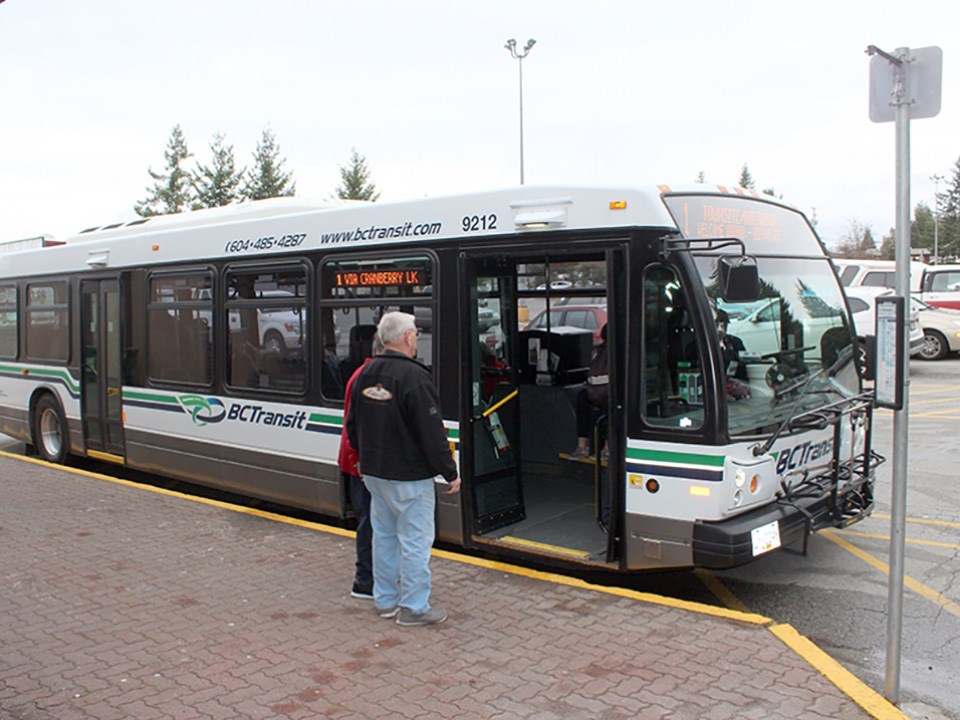City of Powell River Council has voted to expand the city transit service.
At the October 19 city council meeting, councillors considered a motion to sign a memorandum of understanding (MOU) with BC Transit to apply for provincial core sharing funding, for 2,000 hours of additional service for routes one and two, and frequency improvements to route one starting in 2025.
Council further directed staff to include an annual net cost of $184,415 for BC Transit services in the 2024 five-year financial plan, to start in 2025, after receiving final approval for BC Transit. The increase in funding amounts to less than one per cent of the city’s annual budget.
City councillor Rob Southcott said he was glad to see this item come before council.
“As transit becomes more and more important in our community, this will upgrade service to Townsite and the route north, and also, the Grief Point route,” said Southcott. “The one thing I am disappointed about is that BC Transit chose Kelowna for its trial of an app-driven bus like our Zunga Bus, instead of Powell River. Hopefully we can maintain our on-demand service until BC Transit sees fit to help us fund that part of the service, which is becoming useful for our community.”
Councillor Cindy Elliott said part of the improvements will be to decrease the amount of time people have to wait for a bus, improving access.
She said there needs to be a lobby effort to get BC Transit to fund the Zunga Bus.
Council unanimously passed the motion to sign the memorandum of understanding with BC Transit.
At the October 17 committee of the whole meeting, director of infrastructure Tor Birtig said this service expansion is scheduled to commence in January 2025.
“One thing to note is additional vehicles are required for these additional hours, and if the city signs the MOU and later decides not to pursue the service expansion, the lease fees will be added to our operating budget for a minimum of one year,” added Birtig. “Today, given the uncertainties of our city budget, council may not support the MOU as an expansion and await further opportunities for expansion in subsequent years. Otherwise, we are looking to sign the MOU and endorse the expansion of our transit system.”
Elliott asked if the expansion considers the coordination with on-demand busing service.
BC Transit senior manager of government relations Rob Ringma said last year, BC Transit completed a service discussion document, which is a planning document. He said it aligned and tried to work with the Powell River vision and goals.
“It outlined proposed transit plans for the next several years,” said Ringma. “The two key recommendations were to look to improve and potentially consolidate routes one and two to achieve 30-minute frequency. The other priority or recommendation was to explore replacing the existing route three with expanded, digital on-demand transit service.
“BC Transit is committed to working to support Powell River in its interest in pursuing continued digital on-demand service. We have completed several digital on-demand feasibility studies to examine a number of digital on-demand transit scenarios and the applicability in different locations. We’re at the stage now of launching phase one of that digital on-demand transit service in Kelowna, starting in 2024.”
After this stage, testing the viability of on-demand transit, Ringma said the program will move into stage two, where BC Transit will look at communities such as Powell River to develop additional support. Phase two is planned for some time in 2025, said Ringma.
Councillor George Doubt said with regard to the upgrade in service being proposed, people want more frequent service to make it more convenient.
“I understand the digital on-demand service and we’ll have a separate discussion about digital on-demand when we look at our draft of the budget for 2024,” said Doubt. “Last year, city taxpayers paid for about half of the Zunga Bus service.
“I’m in favour of going ahead with the additional 2,000 hours of additional service to improve bus service in 2025.”
Southcott asked about electric buses. Ringma said buses have been procured and charging facilities have been constructed in Victoria, where there will be a trial.
“We have made a commitment not to purchase heavy duty diesel buses moving forward,” said Ringma. “As we procure battery electric buses, we are replacing diesel buses.”
Join the Peak's email list for the top headlines right in your inbox Monday to Friday.



